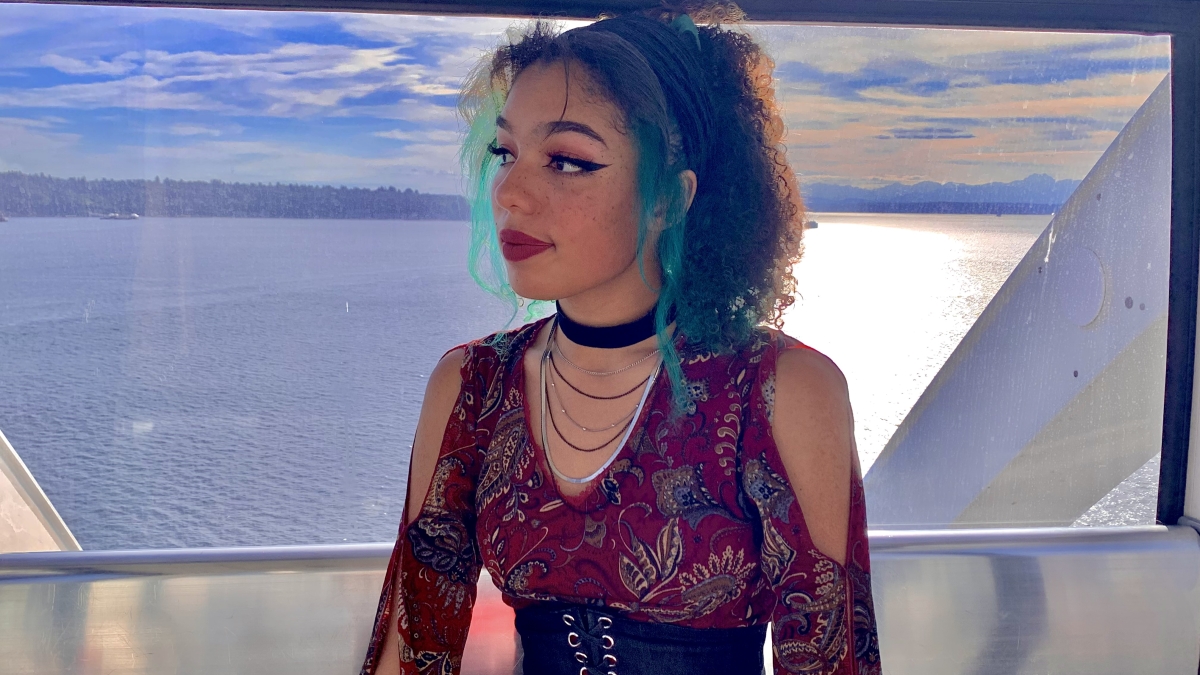Editor’s note: This story is part of a series of profiles of notable fall 2022 graduates.
Sheilah Utley started her college journey in her hometown of Flagstaff, Arizona, at Northern Arizona University. She said she “major hopped” through a variety of STEM fields, but none of them made her happy.
Utley realized she wanted to pursue her love of theater and needed a fresh start in a new setting, so she transferred to Arizona State University.
“I had heard about ASU’s theater program, and I knew that Phoenix was such an urban hub,” she said. “Now I know I was supposed to go to ASU.”
She’s graduating with a bachelor’s degree in theater and a minor in music theater from the School of Music, Dance and Theatre. Utley said her experience at ASU has been very fulfilling.
“It’s been so much fun. Theatre is my outlet and I needed it,” Utley said. “On top of that, I love studying other things: dance classes, music classes. Being in the minor broadened my horizons completely.”
She said that being part of the theater community at ASU and in the Phoenix area expanded her view of theater.
“Growing up in a small town with such a limited experience in theater, I never knew there was such a range,” she said. “You have to understand the psychology of people to play different characters. It’s so collaborative.”
After graduation, Utley plans to work in Arizona to pay off student loans before moving to Los Angeles to pursue acting as a career.
Utley shared about her professors, the advice she’d give to current students, her favorite spot on campus and how she’d like to help shape the world.
Question: Which professor taught you the most important lesson while at ASU?
Answer: The nice thing about being a Herberger Institute student is the faculty are so supportive, no matter what. I love it. Without the faculty, I don’t know if I would have stayed in college. They gave me a lot of motivation, especially through the pandemic. They taught me to adapt and overcome the hardships. They all taught me so many different things.
Gene Ganssle taught me about screen acting. Micha Espinosa provided so many opportunities. David Barker always forced me to think. Joya Scott taught me about experimental theatre and addressing world issues.
I would not be as advanced as I am without Bill Partlan. He has been such an inspiration to me throughout the two years I’ve had him—as an actor and as a director. He’s always making sure that I’m learning. He always has amazing stories to tell. I get so inspired by him. Hearing his stories proved to me that our career isn’t a sprint; it’s a marathon. That’s how I want to be.
I go to Rachel Finley for everything. She’s always the first person to say, “How can I help?” The cool thing about Rachel is that she gives advice from multiple points of view.
I only had (faculty associate) Heidi Dippold for one class on audition techniques, but the feedback that she gave me was the most constructive feedback I’ve ever received in college. She showed us the students she’s mentoring; it gave us all hope. You don’t have to work from the very bottom up; you just have to work.
The faculty here at ASU have helped me with these amazing opportunities. That’s why I genuinely love what I do here. I want other people to experience it.
Q: What’s the best piece of advice you’d give to those still in school?
A: Try everything, literally everything. There’s so much acting and theatre to be found in every facet of life, even in STEM fields. There’s so much to be found, so why limit yourself and tunnel vision into one form? You never know if you’re going to love it or hate it until you try it.
Q: What was your favorite spot on campus?
A: My favorite spot is the lobby of the (Nelson Fine Arts Center). It’s such a hub. Everyone is there; you run into your friends all the time. Even if you don’t have class with your friends, you still see them all the time because they’re in that building. I’ll walk through and five of my friends will be sitting there, waiting for class. Plus there’s food, which is nice. It’s such a communal place with so much art going on with dance and theatre students.
Q: If someone gave you $40 million to solve one problem on our planet, what would you tackle?
A: Forty million dollars isn’t enough to tackle the world, so I’d like to bring it local. I’d spend it on environmental psychology. How can we bring up a neighborhood without gentrifying it? I want to look at neighborhoods and see what is supplying the neighborhoods. How many parks are there versus how many liquor stores? You have to look into the history and the culture and have museums showcasing that heritage, seeing the whole picture of psychology around a neighborhood.
I want to find a way to bridge science, technology, engineering, math and the arts. You can’t have one without the other. I am heavily influenced by artists who tackle big world issues and translate them so that the common person can digest it. I want to bridge the gap and teach world issues so that anyone from any background can understand it.
More Arts, humanities and education

ASU professor's project helps students learn complex topics
One of Arizona State University’s top professors is using her signature research project to improve how college students learn…

Award-winning playwright shares her scriptwriting process with ASU students
Actions speak louder than words. That’s why award-winning playwright Y York is workshopping her latest play, "Becoming…

Exceeding great expectations in downtown Mesa
Anyone visiting downtown Mesa over the past couple of years has a lot to rave about: The bevy of restaurants, unique local shops…


